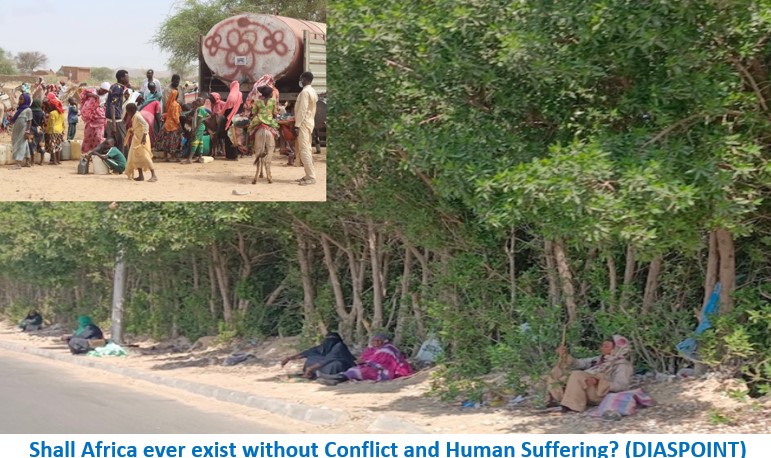As Arm Conflict Game of Thrones Rages in Sudan, the Neighbors Pay the Price
Post By Diaspoint | May 31, 2023

Muhammad Saqr, a truck driver, left Cairo with a load of thinners on April 13, heading to Khartoum. By the time he had arrived at the border, the battle had flared up. Saqr remained, like dozens of trucks, waiting for the borders to be reopened.
On April 15, 2023, clashes erupted in Sudan between the army led by Lieutenant General Abdel Fattah al-Burhan and the Rapid Support Forces led by Lieutenant General Muhammad Hamdan Dagalo, known as “Hamidti.” According to the UN, the clashes have resulted in hundreds of deaths and displaced more than a million people, with 840,000 internally displaced while another 250,000 have crossed the borders.
Saqr was stuck at the border for 28 days.
“We began to run out of supplies, and we reassured ourselves that the situation would improve tomorrow. Twenty-eight days passed while we slept in the open. The information we received from the bus drivers transporting the displaced from Sudan to Egypt convinced us that there would be no immediate relief. We knew that if we entered Khartoum alive, we would leave in shrouds,” Saqr told IPS.
“The merchant to whom we were transferring the goods asked us to wait and not return (home), particularly because he could not pay the customs duties due to the banks’ closure.”
Eventually, they returned with the goods to Cairo, Saqr said.
Mahmoud Asaad, a driver, was stuck on the Sudanese side of the border. Due to customs papers and permits, the livestock he was transporting had already been stuck in the customs barn in Wadi Halfa, Sudan, for thirty days. Then when the conflict broke out, the cows were trapped for another thirty days.
“We used to transport shipments of animals from Sudan to Egypt regularly,” Asaad explains. The average daily transport of animals to Egypt was roughly 60 trucks laden with cows and camels. This trade has stopped, and many Sudanese importers have fled to Egypt while waiting for the conflict to end.
“Sudan is regarded as a gateway for Egyptian exports to enter the markets of the Nile Basin countries and East Africa, and the continuation of war and insecurity will reduce the volume of trade exchange between the two countries, negatively impacting the Egyptian economy, which is currently experiencing some crises,” Matta Bishai, head of the Internal Trade and Supply Committee of the Importer’s Division of the General Federation of Chambers of Commerce, told IPS.
According to Bishai, commodity prices have risen significantly in recent months as the Egyptian pound has fallen against the US dollar. He also stated that the current situation in Sudan would result in additional price increases in the coming months, particularly for commodities imported from Sudan, such as meat.
Bishai explained that while Egypt had an ample domestic meat supply, it was nevertheless reliant on imports.
Read More from original source
